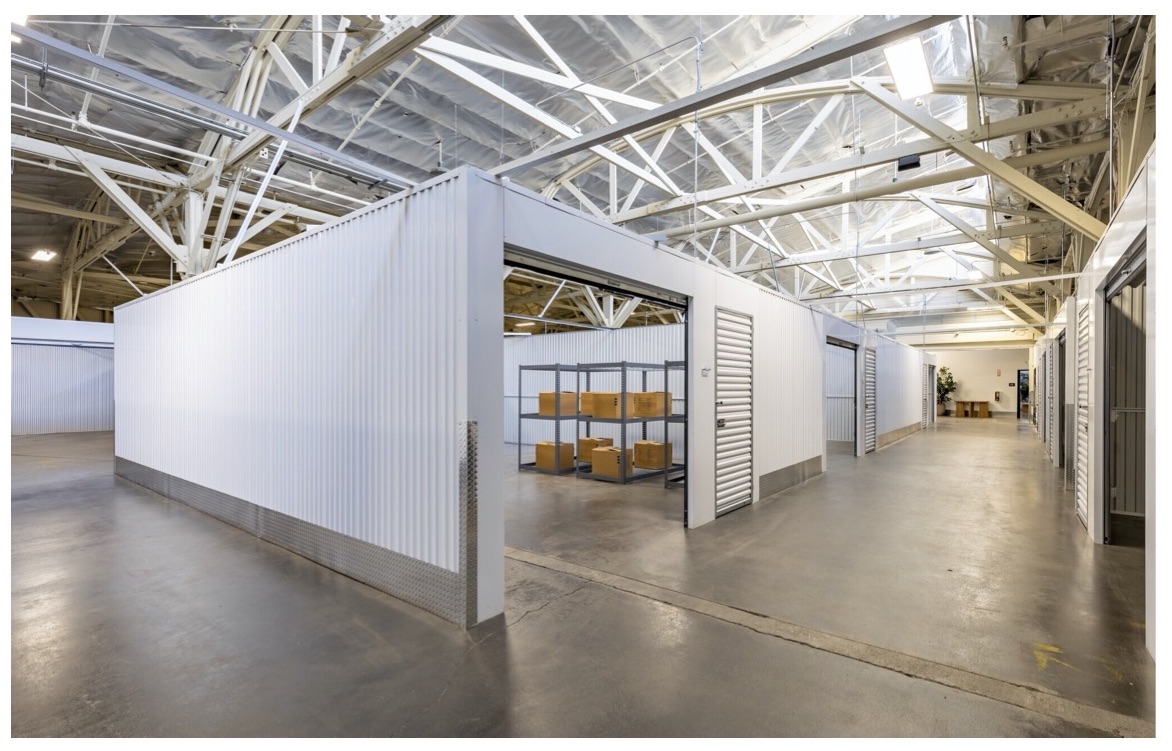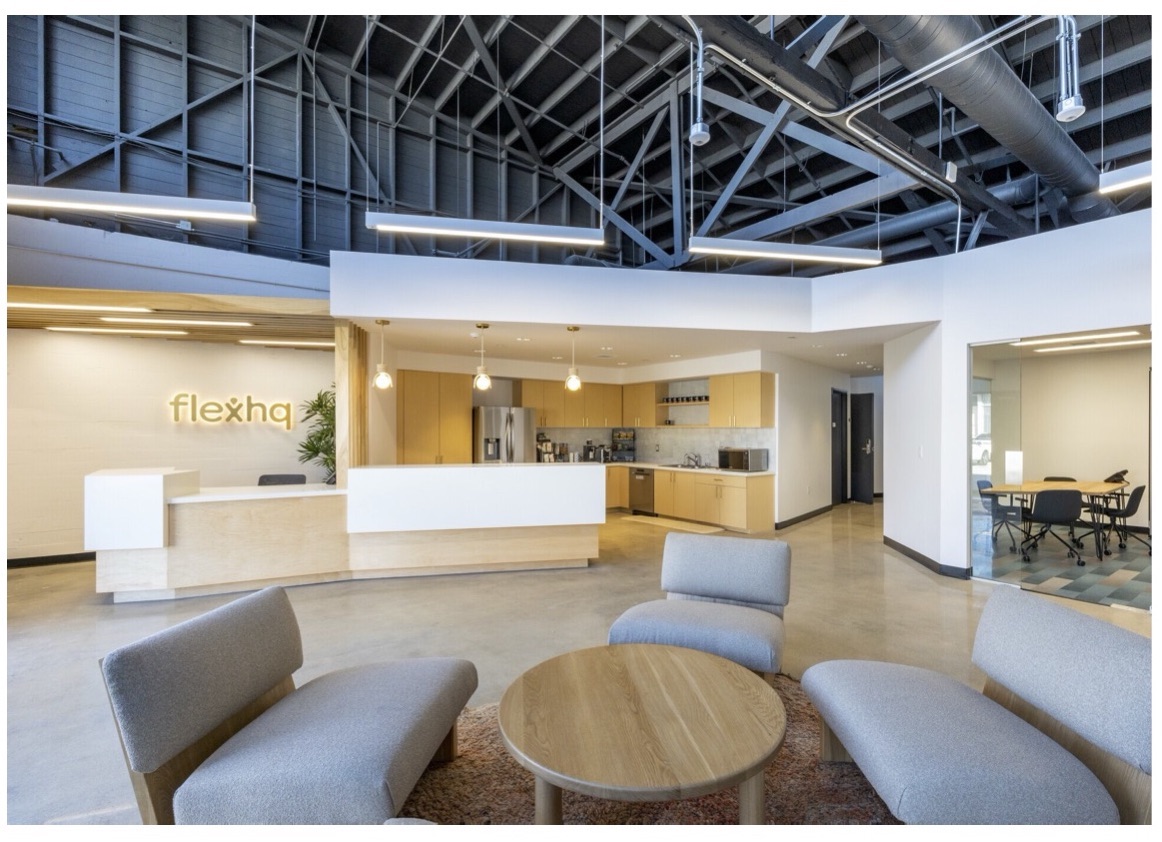The design firm Ware Malcomb has partnered with FlexHQ, a Los Angeles-based firm offering cowarehouse leasing solutions, to create a scalable workspace that emphasizes leasing flexibility and higher-quality and environmentally friendlier amenities than aren’t commonly found in this building type, say representatives from both companies.
Late last year, FlexHQ—which is backed by the self-storage company Storage Etc. and real estate developer KOAR International—opened its first location, a 50,000-sf warehouse in Los Angeles that offered warehouse and office spaces ranging from 300 to 3,000 sf. Sometime this summer, FlexHQ is scheduled to open a 75,000-sf cowarehouse in Denver with 67 warehouse spaces of varying sizes, along with 21 private offices, and amenities that include high-speed internet, conference rooms, daily shipping and receiving services, a communal kitchen, a professional photo studio, and podcast studio.
The Denver Post reported that FlexHQ paid $10.8 million to acquire the Denver building in September 2022. FlexHQ intends to own its cowarehouses as it grows. FlexHQ’s immediate expansion plans call for opening cowarehouses in Salt Lake City and Dallas, according to Laurent Opman, the company’s cofounder, in response to emailed questions from BD+C. The company is also exploring growth opportunities in Florida and Tennessee.
Opman says that FlexHQ was attracted to Ware Malcomb’s “deep experience” in industrial and warehouse architecture, its nationwide offices, and its close relationship with CBRE, which is providing construction management services for FlexHQ’s projects. Other members of the Building Team on the Denver project are the GC Alcorn Construction, and a local architect Intergroup Architects.
A sustainable interior design for cowarehouse facility

FlexHQ has entered what can best be described as a crowded but fragmented competitive field, led by Cubework, with around 80 locations nationwide and in Canada, and several other locations scheduled to open soon, according to its website. Saltbox, with 10 locations, touts is cowarehouses as “built by entrepreneurs for entrepreneurs.”
By offering space options, FlexHQ is appealing to startups and smaller businesses that are seeking lease flexibility as their companies’ needs change. FlexHQ, says Opman, is “rooted in the experience of its founders” in commercial real estate acquisition and development, with an emphasis on adaptive reuse. Opman adds that FlexHQ is focused on “delivering the best locations, high quality improvements, and the highest level of operation and user’s experience.”
In addition to EV charging stations, Ware Malcomb’s sustainable design for the Denver location includes upgrading and retrofitting the building’s entire lighting system, and using recycled building materials, energy saving fixtures, and green technologies that reduce the facility’s carbon footprint.
What’s different from competitors’ cowarehouses, says Hardev, is an “elevated design” with natural materials “to bring warmth to a space that is generally seen as a stark and cold environment.” Branding and graphics for wayfinding provide a “curated cowarehousing space where businesses feel a sense of community as well as foster creative energy.”
The communal experience that FlexHQ is striving to create might present price barriers for some tenants. Opman told Bisnow.com that the average rent for space in its Los Angeles facility is about 2.5 times higher than the average warehouse space, and twice what self-storage would charge.
Combining warehouse and office spaces also presents some design and engineering challenges, says Bhavini Hardev, Ware Malcomb’s Studio Manager. She explains that acoustics, functionality, user friendliness, and security are the focal points of the layout whose quiet office spaces must coexist with noisier loading and storage areas. The design takes these adjacencies into account with “strategic placement” of rooms and materials.
Related Stories
| Aug 11, 2010
SSOE, Fluor among nation's largest industrial building design firms
A ranking of the Top 75 Industrial Design Firms based on Building Design+Construction's 2009 Giants 300 survey. For more Giants 300 rankings, visit http://www.BDCnetwork.com/Giants
| Aug 11, 2010
Best AEC Firms of 2011/12
Later this year, we will launch Best AEC Firms 2012. We’re looking for firms that create truly positive workplaces for their AEC professionals and support staff. Keep an eye on this page for entry information. +
| Aug 11, 2010
Manitoba Hydro Place, Tornado Tower among world's 'best tall buildings,' according to the Council on Tall Buildings and Urban Habitat
The Council on Tall Buildings and Urban Habitat last week announced the winners of its annual “Best Tall Building” awards for 2009, recognizing one outstanding tall building from each of four geographical regions: Americas, Asia & Australia, Europe, and Middle East & Africa. This year’s winners are: Manitoba Hydro Place, Winnipeg, Canada; Linked Hybrid, Beijing, China; The Broadgate Tower, London, UK; Tornado Tower, Doha, Qatar.
| Aug 11, 2010
Nation's first multi-story green industrial facility opens in Brooklyn
The $25 million Perry Avenue Building at Brooklyn Navy Yard is the nation's first multi-level green industrial facility and the first building in New York City to incorporate building-mounted wind turbines. The wind turbines, along with rooftop solar panels, will provide electricity for the building's lobby and common areas.
| Aug 11, 2010
Call for entries: Building enclosure design awards
The Boston Society of Architects and the Boston chapter of the Building Enclosure Council (BEC-Boston) have announced a High Performance Building award that will assess building enclosure innovation through the demonstrated design, construction, and operation of the building enclosure.
| Aug 11, 2010
Portland Cement Association offers blast resistant design guide for reinforced concrete structures
Developed for designers and engineers, "Blast Resistant Design Guide for Reinforced Concrete Structures" provides a practical treatment of the design of cast-in-place reinforced concrete structures to resist the effects of blast loads. It explains the principles of blast-resistant design, and how to determine the kind and degree of resistance a structure needs as well as how to specify the required materials and details.
| Aug 11, 2010
Gensler, HOK, HDR among the nation's leading reconstruction design firms, according to BD+C's Giants 300 report
A ranking of the Top 100 Reconstruction Design Firms based on Building Design+Construction's 2009 Giants 300 survey. For more Giants 300 rankings, visit http://www.BDCnetwork.com/Giants
| Aug 11, 2010
Data center construction costs are down, according to a study by Environmental Systems Design
The current economic crisis has an up-side for owners of mission-critical facilities: On average, it costs less today to construct a new data center than it did in late 2007, according to a study by Environmental Systems Design (ESD). ESD found that the prices of feeder and cable have dropped by more than half, major data center equipment by 12%, labor and materials by 19.6%, and shipping and handling by 15% from the fourth quarter of 2007 to July 15, 2009.
| Aug 11, 2010
Roof board is tough enough for Kia Motors manufacturing plant
For Kia Motors, selecting the right roof board was an important aspect of the company’s $1 billion project to build a new manufacturing plant in West Point, Ga. Kia and its primary roof design expert for the project, All South Subcontractors Inc. of Birmingham, Ala., were faced with many roof board choices, such as asphaltic, mineral fiberboard, plywood/OSB, wood fiberboard, perlite, and paper faced gypsum.







